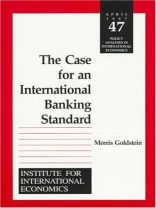This study presents the case for an international banking standard (IBS) to deal with the rash of banking crises in developing countries. Over the past 15 years, almost three-fourths of the IMF’s member countries have experienced at least one serious bout of banking problems; there have been at least a dozen developing country episodes where the costs of these crises amounted to 10 percent or more of the country’s GDP; and the total public sector resolution costs of developing-country banking crises have been estimated to be $250 billion. Not only are these banking crises extremely costly to developing countries, they also pose increased risk to industrial countries.
Morris Goldstein demonstrates that existing international agreements do not address the main sources of these crises, and the adoption of a voluntary IBS offers a more attractive route to banking reform than the relevant alternatives. The study recommends minimum standards in eight key areas of banking supervision and addresses the operational issues associated with the design and implementation of an IBS.
Giới thiệu về tác giả
Morris Goldstein, nonresident senior fellow, has held several senior staff positions at the International Monetary Fund (1970–94), including Deputy Director of its Research Department (1987–94). From 1994 to 2010, he held the Dennis Weatherstone Senior Fellow position at the Peterson Institute. He has written extensively on international economic policy and on international capital markets.












